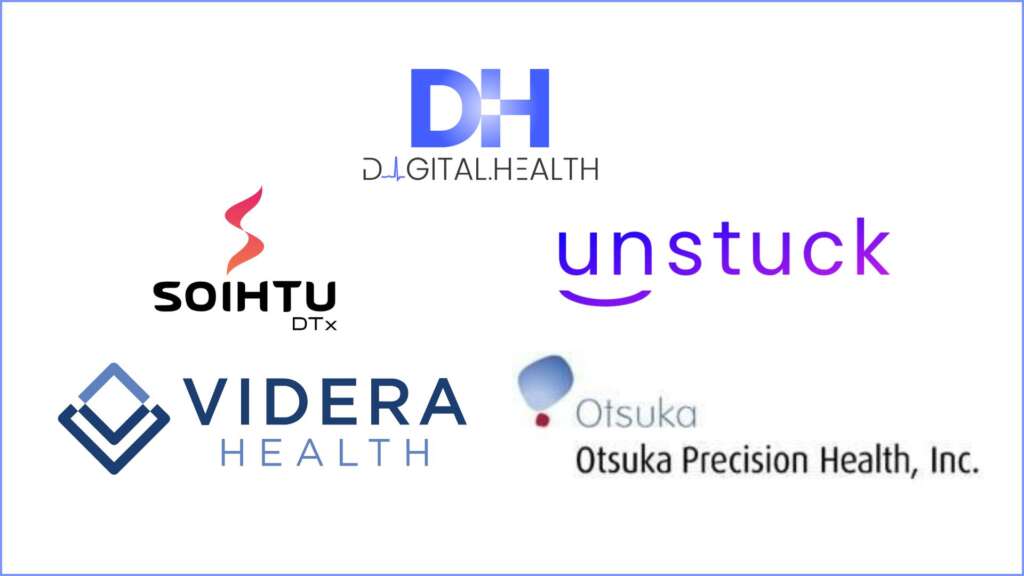Join Us for Our Fourth Annual Virtual Conference!

Join us in advancing the future of mental health by partnering with us to showcase your organization’s impact and innovation. Gain unparalleled exposure to top researchers, clinicians, tech leaders, and policymakers in the field. Register for our 2025 Annual Conference, co-hosted by University of Virginia’s Thriving Youth in a Digital Environment (TYDE).
The conference theme is Advancing Digital Mental Health in a Rapidly Changing World. With a youth mental health crisis, changing political landscape, complex effects of AI and social media, and many unknowns about the future of healthcare, we come together to discuss the opportunities and challenges of implementing digital solutions to increase access to care during this unique time.
This interdisciplinary conference will bring together researchers, healthcare providers, payers, industry leaders, developers, patient advocates, regulatory organizations, and policy experts with the goal of sharing cutting edge research and discussing how best to advance equitable, evidence-based improvements in digital mental healthcare. We are also excited to offer networking opportunities, special events for students, and Ask Me Anything (AMA) Reddit-style opportunities to engage with experts.
An ASL interpreter is available upon request.
Day 1 Schedule – Monday, June 9, 2025 (all times EDT)
11:00am: Welcome!
11:10am: Keynote address by Katie Drasser, CEO of Rock Health, moderated by David Mohr, President of SDMH
12:00pm: Break
12:10pm: Invited Panel on Challenges and Opportunities to Address the Needs of Youth Using Digital Mental Health panel with Kathryn Boger, InStride Health; César Escobar-Viera, University of Pittsburgh; Margaret Anton, Two Chairs, Ali Ünlü, University of Virginia; moderated by Bethany Teachman, University of Virginia
1:00pm: Virtual Exhibit Hall moderated by Acacia Parks / Lunch Break
- 1:00-1:20pm: Virtual exhibit by Unstuck
- 1:20-1:40pm: Virtual exhibit by Soihtu DTx
- 1:40-2:00pm: Virtual exhibit by Digital.Health
2:00pm: Poster Sessions (parallel tracks). CLICK HERE to see the presenter lineup.
- Track 1: Evaluating the Effectiveness and/or Quality of Digital Tools
- Track 2: Intervention Development and Engagement
- Track 3: Enhancing Mental Health Among Marginalized or Underserved Communities
- Track 4: Artificial Intelligence and Conversational Agents
- Track 5: Understanding Anxiety and Other Mood Disorders
2:50pm: Break
3:00pm: Ask an Expert Sessions (parallel tracks)
- Data Donation with Munmun De Choudhury, Georgia Institute of Technology; Xiaoran Sun, University of Minnesota; Amy Orben, University of Cambridge; moderated by Benji Kaveladze, Northwestern University
- Digital Mental Health & Securing VC and Foundation Funding with Erin Sietstra, Hopelab; Andrew Barr, GreyMatter Capital; Julia Hoffman; moderated by Bethany Teachman, University of Virginia
- Digital Mental Health & Collaborative Care with Caitlin Stamatis, Otsuka; Khatiya Moon, Northwell Health; Soo Jeong Youn; Reliant Medical Group, OptumCare; moderated by Emma Wilson-Lemoine, University of Virginia
- Digital Mental Health & Reaching Underserved Communities with Giovanni Ramos, University of California, Berkeley; Brenda Curtis, NIH; Kelly Shaffer, University of Virginia; moderated by César Escobar-Viera, University of Pittsburgh
3:50pm: Break
4:00pm: Flash Talks Sessions (parallel tracks). CLICK HERE to see the presenter lineup.
- Track 1: Evaluating the Effectiveness and/or Quality of Digital Tools
- Track 2: Artificial Intelligence and Conversational Agents
- Track 3: Integrating Digital Services in Healthcare, School or Other Systems
4:50pm: Break
5:00pm: Special Interest Groups (SIG) Events (parallel tracks)
- Health Equity SIG: “Navigating a Shifting Landscape: Considerations in Advancing Digital Health Equity for All” with Jacob Gordon, University of Cincinnati; William Liem, Northwestern University; Andrew Berry, Northwestern University; moderated by Yolanda Yang, University of North Carolina Chapel Hill and Kathryn Macapagal, Northwestern University
- In today’s shifting sociopolitical landscape, conversations around health equity and DEI in digital health are more complex—and more critical—than ever. Join the Health Equity Special Interest Group for a panel discussion with scholars and designers whose work focuses on mental/behavioral health and wellbeing in LGBTQ youth, people with disabilities, and people with complex health issues, and how digital tools do and don’t meet their needs. After brief presentations on their work in areas such as ethical AI, online social connection, and human-centered design, discussion and audience Q&A will focus on the challenges and opportunities of advancing equity in digital health research, development, and implementation. Discussion topics will explore how to center underserved communities, respond to shifting discourse and evolving technologies, and how we can support one another in continuing to do digital health equity work.
- Student and Trainee SIG: “Entrepreneurship and Innovation in Digital Mental Health: Navigating the Startup Space” with Ben Nelson, Verily, Harvard Medical School; Nick Allen, Ksana Health; Emily Bernstein, Flagship Labs 105; Valerie Hoffman, Pogo Research; moderated by Page Anderson, Georgia State University.
- The first 10 minutes of this event will be an Update on TYDE Digital Mental Health Training Needs Assessment Results, presented by Simon Daniel, University of Virginia
- What does it take to turn a great idea into a thriving digital mental health startup? Join us for a panel featuring leaders from academia and industry as they share insights on building and scaling products, securing funding, translating research into real-world impact, and navigating career transitions. Geared toward students and early-career professionals, this session will explore the entrepreneurial journey—from product development to startup growth—followed by a live Q&A.
- Industry SIG: “Scaling Smart: The Challenge of Clinical Integrity in AI Mental Health Tools Description” with Eduardo Bunge, Palo Alto University, ParenteAI; Kibby McMahon, KulaMind; Dave Cooper, Therapists in Tech; Bayley Taple; Acacia Parks, Goodable; moderated by Caitlin Stamatis, Otsuka
- As AI-driven mental health tools surge in popularity, how do we ensure they’re grounded in clinical science? This session brings together leaders from tech and mental health to discuss strategies for building scalable solutions without sacrificing rigor or trust.
- Health Equity SIG: “Navigating a Shifting Landscape: Considerations in Advancing Digital Health Equity for All” with Jacob Gordon, University of Cincinnati; William Liem, Northwestern University; Andrew Berry, Northwestern University; moderated by Yolanda Yang, University of North Carolina Chapel Hill and Kathryn Macapagal, Northwestern University
5:50pm: Break
6:00pm: Chance to network! Join a breakout room to meet people with similar interests.
- Room 1: Emerging Digital Mental Health Technologies (e.g., AI, passive sensing, social media-based interventions, etc.): Ethics, Challenges & Opportunities, moderated by David Mohr, Northwestern University.
- Room 2: Where Do We Go From Here? Alternative funding routes, supporting those who have been affected by policy changes (international scholars, federal workers, health equity researchers), moderated by Bethany Teachman, University of Virginia.
- Room 3: Integrating Digital Mental Health into Clinical Practice, Triage and Care Navigation, and Workforce Issues, moderated by David Cooper, Therapists in Tech.
- Room 4: Digital Mental Health for Underserved or Underrepresented Groups, moderated by Giovanni Ramos, University of California Berkeley.
- Room 5: Developing Digital Mental Health Through User-Centered Design and Community Partnerships, moderated by Stefanie Sequeira, University of Virginia.
6:45pm: Adjourn
Day 2 Schedule — Tuesday, June 10, 2025 (all times in EDT)
11:00am: Welcome back!
11:10am: Policy Spotlight with Aubrey Shick; Christina Strogis, The ERISA Industry Committee; Jeffrey Abraham, Partner, Health Advances; Michael Pace, PalmHealth Co; moderated by Trina Histon
12:00pm: Break
12:10pm: Poster Sessions (parallel tracks). CLICK HERE to see the presenter lineup.
- Track 6: Evaluating the Effectiveness and/or Quality of Digital Tools
- Track 7: Intervention Development and Engagement
- Track 8: Integrating Digital Services in Healthcare, School or Other Systems
- Track 9: User-Centered Design and Community Partnerships
- Track 10: Children, Adolescents, and Young Adults
1:00pm: Break
1:10pm: Graduate School Open House / Virtual Exhibit Hall moderated by Lisa Palko, Society for Digital Mental Health / Lunch Break
- 1:10-1:30pm: Virtual exhibit by Videra Health
- 1:30-1:50pm: Virtual exhibit by Otsuka Precision Health
- Graduate School Open House: This session will be aimed at current undergraduates and post-baccalaureate individuals interested in pursuing a graduate degree in the digital mental health space. Current students from various academic disciplines will speak about their graduate program and research labs. Attendees will also have the chance to join breakout rooms for Q&A and informal discussion. Panelists include Daeun Yoo, University of Washington; Tori Walters, San Diego State University; Sukriti Ghosh, Dartmouth College; Yama Chang, Dartmouth College; Emma Wolfe, University of Virginia.
2:00pm: Invited Panel on Digital Mental Health in the Shifting Political and Healthcare Landscape with Chris Hemphill; Adimika Meadows Arthur, Health Tech for Medicaid (HT4M); Vaile Wright, American Psychological Association; Stephen Schueller, University of California, Irvine; moderated by Adrian Aguilera, University of California, Berkeley
2:50pm: Break
3:00pm: Flash Talk Sessions (parallel tracks). CLICK HERE to see the presenter lineup.
- Track 4: Enhancing Mental Health Among Marginalized or Underserved Groups
- Track 5: Intervention Development and Engagement
- Track 6: Children, Adolescents, and Young Adults
3:50pm: Break
4:00pm: Ask an Expert Sessions (parallel tracks)
- Digital Mental Health & Healthcare Regulatory/Compliance Issues with Megan Coder, Digital Health Policy; Jessica Jackson, Therapy is for Everyone; Leanna Fortunato, American Psychological Association; moderated by Allie Silverman, Massachusetts General Hospital/Harvard University
- Digital Mental Health & Scaling Measurement Based Care with Caitlin Shepherd, Within Health; Marisa Perera, Two Chairs; Simon Weisz, Greenspace Health; moderated by Emma Wilson-Lemoine, University of Virginia
- Opportunities, Safety & Ethics in Generative AI with Derrick Hull, Slingshot AI; Kay Nikiforova, Violet; Ashleigh Golden, Wayhaven; moderated by Arka Ghosh, Northwestern University
- Digital Accessibility with Andrea Graham, Northwestern University Feinberg School of Medicine; Karen Fortuna, Geisel School of Medicine at Dartmouth, Department of Community and Family Medicine; Adam Goodkind, University of Maryland; moderated by Bethany Teachman, University of Virginia
4:50pm: Break
5:00pm: Member meeting
5:50pm: Break
6:00pm: Career Panel and Youth Voices panels (parallel tracks)
- Career Panel: The Student & Trainee SIG is thrilled to host a panel of talented industry professionals discussing common roles in the digital mental health world. Our panelists will discuss their shared and differing experience in domains of research, product, quality control, and operations. We are pleased to be joined by the following panelists: Sara Sagui-Henson, PhD (Modern Health); Edmund Neuhaus, PhD, ABPP (Blue Train Design Consulting, LLC); Trina Histon, PhD (Woebot Health). This session will be moderated by Emma Wolfe, University of Virginia.
- Youth Voices Panel: Hear from teens and young adults who recently won a hackathon where they were tasked with developing digital solutions to improve teens’ experience on social media, including how they would reduce the tendency to make negative social comparisons online and how they would encourage making positive social connections online. The panel will highlight their views about how to best design digital mental health tools for teens. It will be moderated by Stefanie Sequeira, University of Virginia.
6:45pm: Adjourn
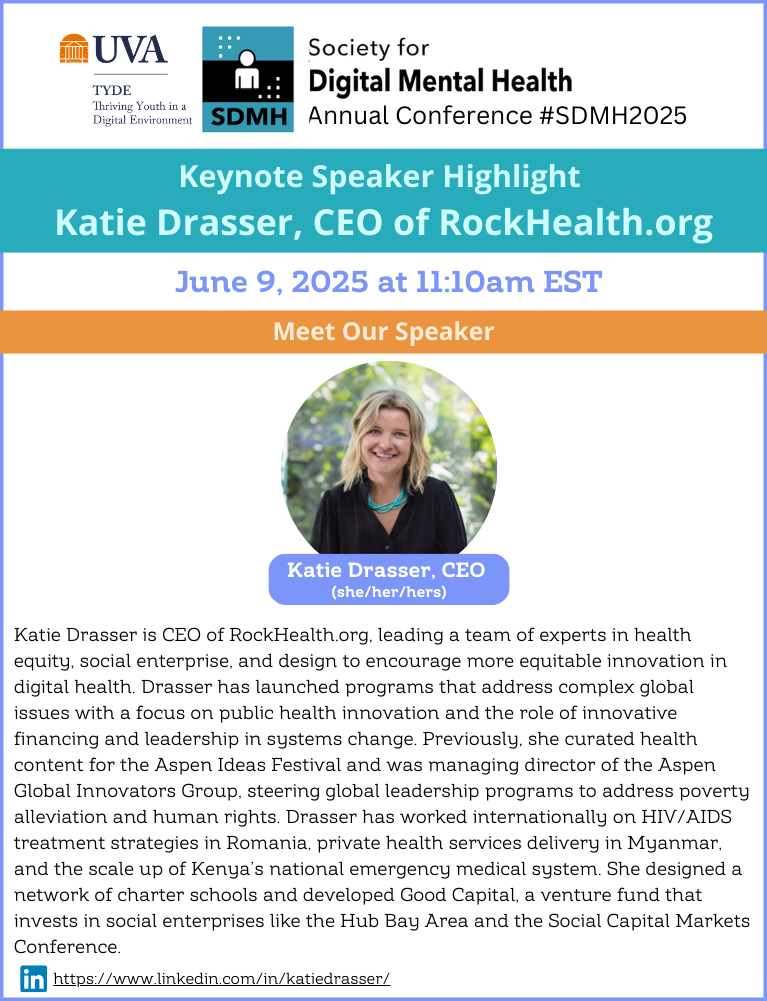
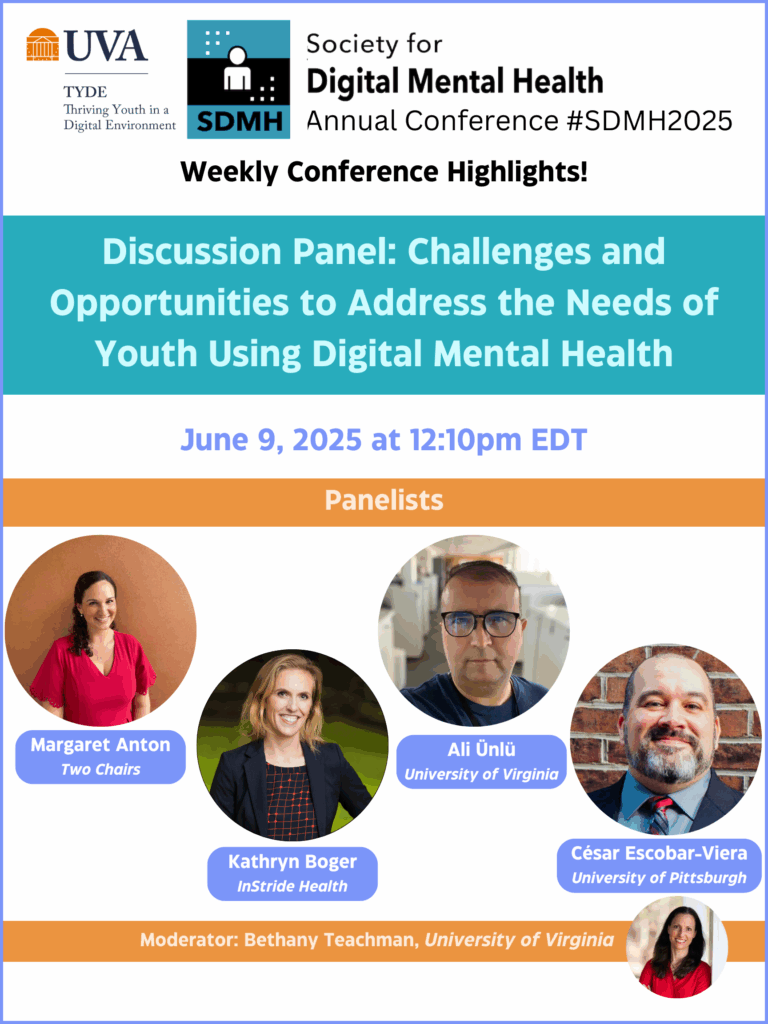
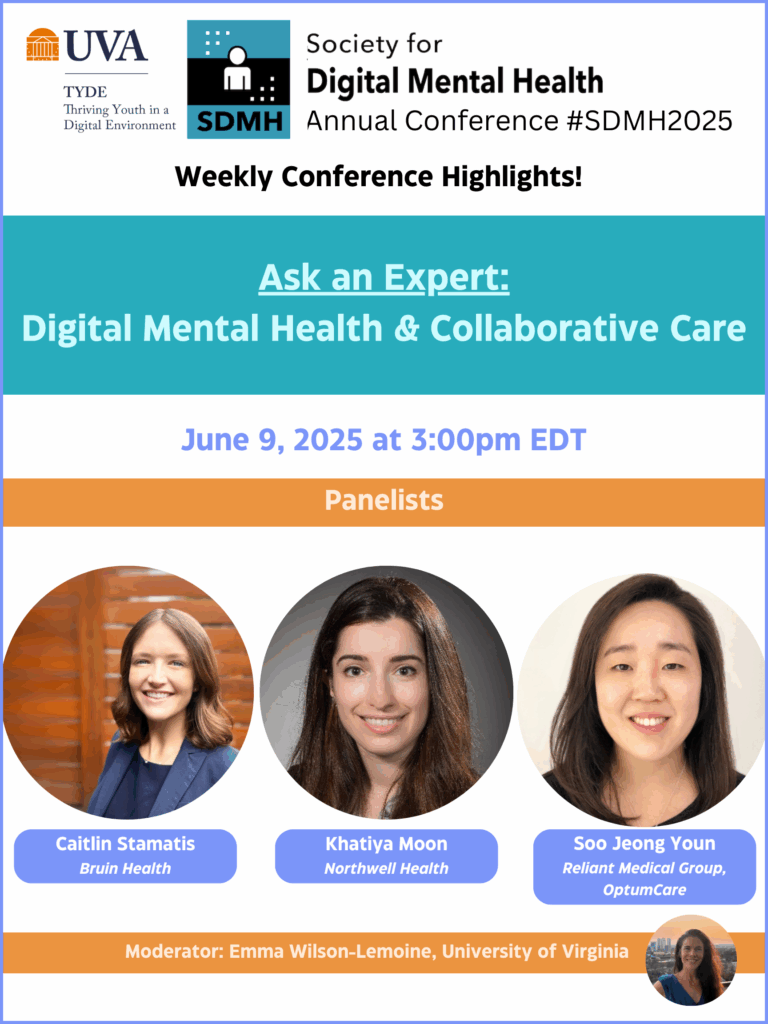
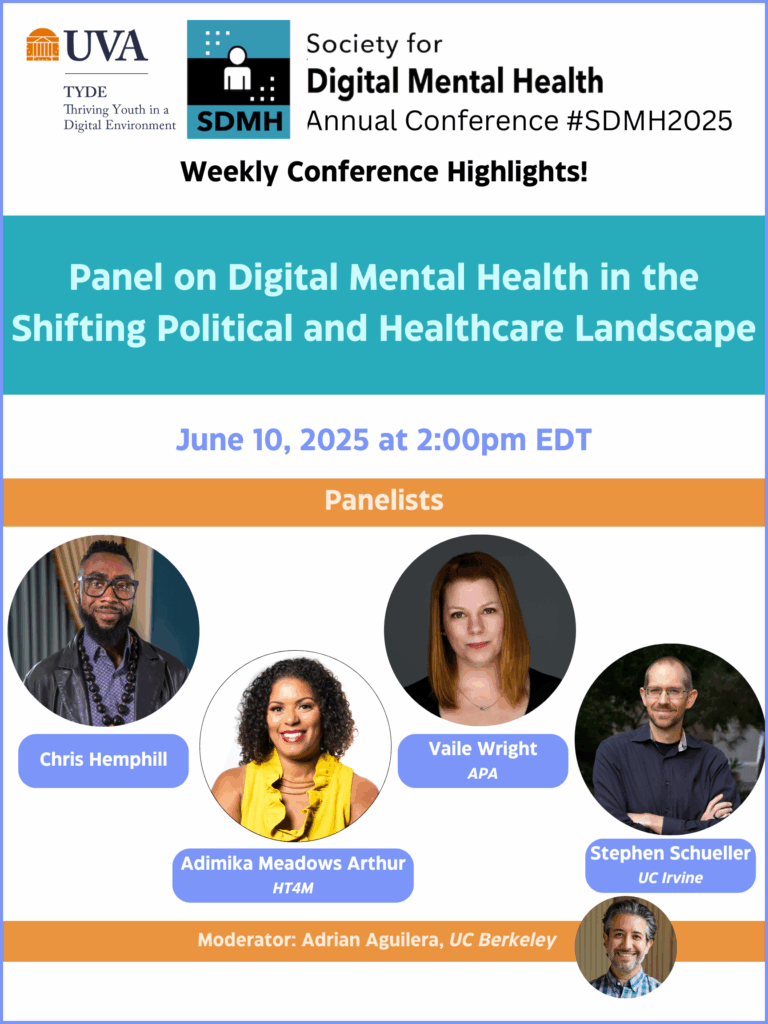
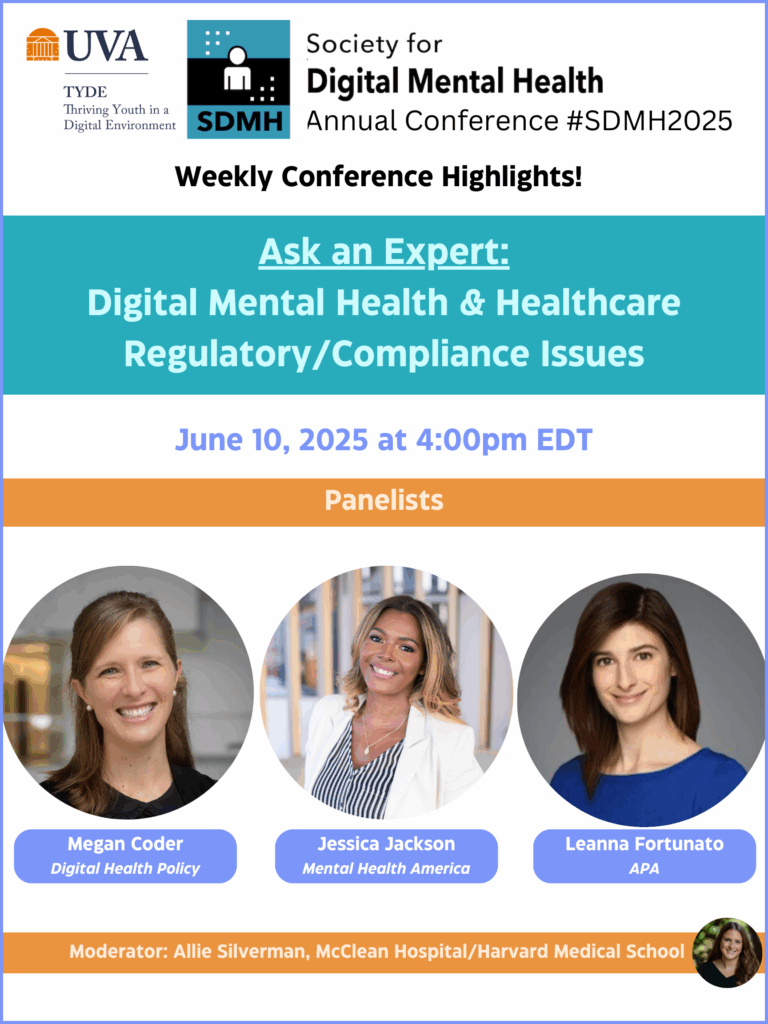
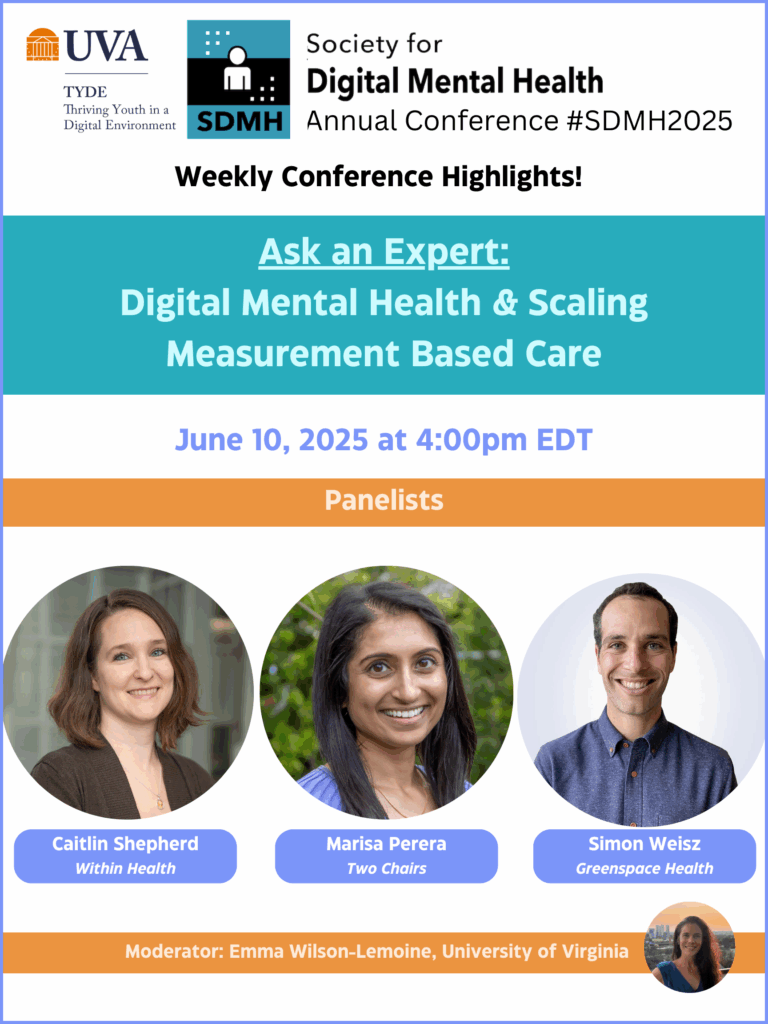
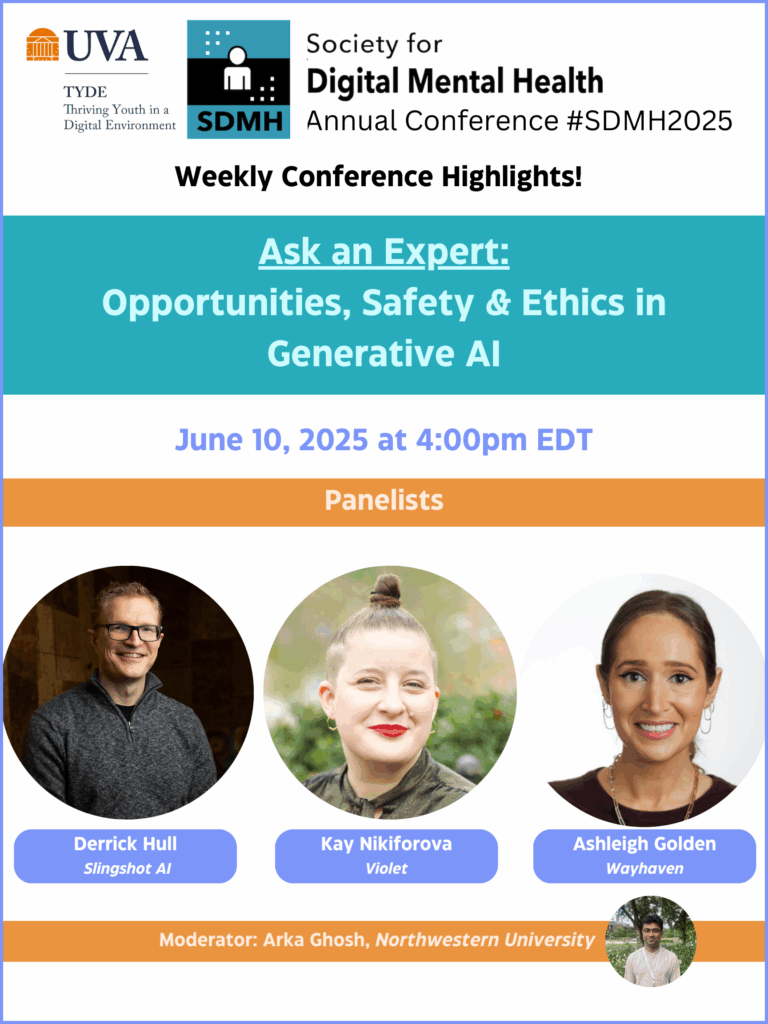
Information for Presenters
- Conflicts of Interest: We are asking all presenters to ensure they include mention of any Conflicts of Interest or relevant Disclosures tied to the work they will be presenting during their talk or poster presentation.
- Technical Help: Please address any technical questions that arise during the conference to Tanvi Lakhtakia (qmc2wq@virginia.edu) or message her directly using the Zoom Events platform.
- Recording: All conference sessions will be recorded for educational purposes.
- Accessibility: We strive to host inclusive, accessible events that enable all individuals to engage fully. To request an accommodation or for inquiries about accessibility, please contact Bethany Teachman (bat5x@virginia.edu).
- Poster Presenters: CLICK HERE to find out which track you’re assigned to.
- Flash Talk Presenters: CLICK HERE to find out which track you’re assigned to.
- Format of Sessions: During your assigned time slot, you will be able to share your screen to present your poster (2 minutes maximum) or your flash talk (5 minutes maximum). At the time of the presentation, the event moderator will unmute your microphone and you will have the ability to share your screen. Please stick to the time limit so all presenters will have a chance to share their work! The Zoom-based event interface displays a list of conference sessions, both scheduled and in progress. Please join your session five minutes before it is scheduled to begin if you are presenting. Out of respect for the other conference speakers and attendees, we ask that you remain muted unless you are actively presenting or asking questions/engaging in discussion.
- Zenodo Repository: Please upload your poster/talk (and any supporting materials you wish, e.g., data or code) to Zenodo to provide a record of conference presentations and enhance your work’s visibility, transparency, and reproducibility. Please upload your poster/talk to the SDMH Annual Meeting 2025 repository by June 10, 2025. To upload, see the Curation Policy and follow the instructions on that page. Please contact Jeremy Eberle (jeremy.eberle@northwestern.edu) with any questions about uploading materials to Zenodo. Thank you for sharing your work!
- Student Poster Awards: We are excited to be offering poster awards. To be eligible for a poster award, the first author of the poster must be a postbaccalaureate (such as a research assistant), an undergraduate, or graduate student. If you would like your poster to be considered for an award, please upload your poster to Zenodo by June 2, 2025.
- Poster Format and Guidelines: We do not have specific font or size guidelines for posters. However, we are asking that posters follow the Better Poster format. If you are unfamiliar with this format, you can get more information here. There are also numerous templates online, but here is one example. You do not have to adhere rigidly to this format, but we encourage authors to attend to the ways this format helps other conference participants identify the critical takeaways more easily.
Thank You to Our Sponsors!
Conference sponsors:

Exhibit sponsors:
